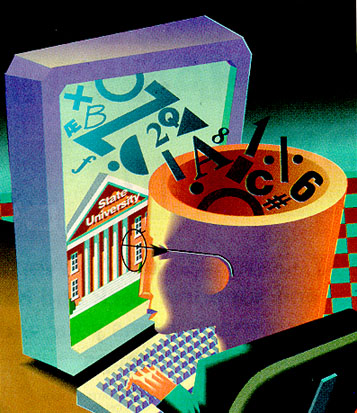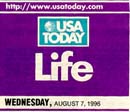 Professors at both schools send out new materials every week,
but old readings continued to spark discussion throughout the
course.
Professors at both schools send out new materials every week,
but old readings continued to spark discussion throughout the
course.


Some Ivy League alumni are coming back to college without ever leaving home.
Brown University and the University of Pennsylvania have begun to offer their graduates courses over the Internet. Brown has had one course each semester since fall 1994, and Penn alumni started their cyberclass last January.
"Electronic communication makes it possible for people who are no longer physically here to still be here," says Penn English professor Al Filreis, who moderated a course on modern American poetry as Penn's first experiment in teaching over the Net.
The universities offer their e-mail classes in similar ways. Alumni subscribe to a mailing list, known as a listserv. The entire course is conducted over the list, so reading your messages is like sitting in a seminar. A professor sends course materials to the "class" and an open discussion follows.
Members can read and reply to the messages at any time of day.
 Professors at both schools send out new materials every week,
but old readings continued to spark discussion throughout the
course.
Professors at both schools send out new materials every week,
but old readings continued to spark discussion throughout the
course.
For universities, offering their alumni the opportunity for lifelong learning is an immeasurable boon, says Elsie Sterling Howard, president of Penn's General Alumni Society. "The opportunity to learn from the same source forever is a great thing," she says.
With tuition at elite universities reaching $30,000 annually, a lifetime connection to campus is also a powerful draw for incoming students, she says.
Brown's program, the Brown University Interactive Network (BRUIN), began as an extension of alumni groups who met to discuss reading lists provided by professors, says Andrew Shaindlin, Brown's associate director of alumni relations. When word of the groups spread to alumni too distant to participate, Shaindlin developed BRUIN as a way to involve more people. Parents of current Brown students can participate as well.
Filreis and Howard designed Penn's program, which doesn't have an official name yet, last year. Neither of them knew about BRUIN, but Filreis had already used the Net for extra discussion in several of his undergraduate English classes on campus.
Both programs have enjoyed early success. More than 180 alumni signed up for Penn's course, and BRUIN courses have drawn up to 85 participants per class.
Penn courses are free for now, but Howard says the university is exploring a small fee that would compensate professors. Brown alumni pay $15 for each class, which covers advertising and a small payment to professors, Shaindlin says.
Though Brown has given four e-mail classes since BRUIN launched and Penn will offer two this fall, both programs are still being revised. Shaindlin just left Brown for the University of Michigan; future development of BRUIN will be up to his successor. At Penn, Filreis says he and Howard have just started talking to other professors about expansion.
Organizers at both schools expect faculty interest to grow. For professors who have already participated in BRUIN, the challenge of adjusting their traditional course materials to a new environment has been hard to resist, Shaindlin says. Teaching students almost twice as old as most undergraduates is also a draw, he adds - they bring fascinating experience and maturity to discussions.
And Filreis praises e-mail because everything is recorded - unlike traditional classes, where the best moments can entrance students so much they stop taking notes.
By Mike Madden, USA TODAY
Document URL:
http://www.english.upenn.edu/~afilreis/Alumverse/usa-today.html
Last
modified: Monday, 02-Aug-2004 17:04:35 EDT